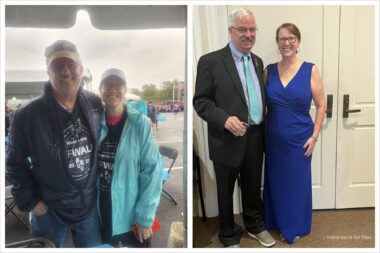Finding a healthy balance between appointments and life activities
Quality of life after lung transplant includes planning social outings

In a single month, I’ve had three vaccinations, three medical procedures requiring anesthesia, two lab tests, one dental appointment, one pentamidine treatment, one appointment at the pulmonary clinic, and one pulmonary function test. As I’ve noted before, life after lung transplant is busy with medical surveillance. I suppose my calendar qualifies as proof of that. Fortunately, I can spread out these appointments over the course of a month.
Is it possible to make such a medical schedule fit with my personal and social life? It is, and I’ve only recently learned how to do it.
I started writing this column on Oct. 10 while sitting in the waiting room at Inova Fair Oaks Hospital in northern Virginia, before having a colonoscopy and endoscopy. I’d arrived that morning after completing the second part of a series of challenging preparations, which included not eating solid foods for days. The waiting room was just above a café that was serving breakfast. Apparently, the smell of bacon can penetrate even the most well-ventilated spaces.
When I was diagnosed with idiopathic pulmonary fibrosis in January 2017, I entered into an agreement with Inova Fairfax’s Advanced Lung Disease and Transplant Clinic, which laid out the expectations of me as a patient to be a part of their program.
When I received a bilateral lung transplant on July 10, 2021, I knew I’d committed to a lifetime of medical surveillance. Neither of the two procedures last week was an emergency. Rather, they were a routine part of expected post-transplant examinations.
However, I did something a little different this time: Each of the 12 appointments I mentioned was scheduled with nonmedical commitments in mind. When possible, I was able to schedule some of the appointments together, so I could keep the other commitments my wife, Susan, and I had made.
Just so you don’t think I’d gone rogue, I did discuss the scheduling with my medical care team. They appreciated the talk, and the adjustments to the schedule weren’t too drastic.
The colonoscopy and endoscopy were scheduled for a Tuesday because I didn’t want the prep to interfere with the plans we had the previous Saturday. That day, Susan and I had committed to supporting the Pulmonary Fibrosis Foundation’s Walk in Washington, D.C., an event focused on raising funding and awareness. Later, we had a charity gala for a local arts council. Both of these events were important to us.

At left, Sam Kirton and his wife, Susan, take shelter from the rain during the Pulmonary Fibrosis Foundation’s Walk in Washington, D.C., on Oct. 7. Later that evening, at right, the couple attends a charity gala. (Courtesy of Sam Kirton)
My recently discovered ability to balance the medical appointments and nonmedical activities of my post-transplant life has been liberating. It’s vital that I make time for enriching events that aren’t about my healthcare.
The results of both procedures were good and didn’t reveal any immediate concerns. But taking time for my other life activities is another way I can honor my donor’s gift and make every breath count.
Note: Pulmonary Fibrosis News is strictly a news and information website about the disease. It does not provide medical advice, diagnosis, or treatment. This content is not intended to be a substitute for professional medical advice, diagnosis, or treatment. Always seek the advice of your physician or other qualified health provider with any questions you may have regarding a medical condition. Never disregard professional medical advice or delay in seeking it because of something you have read on this website. The opinions expressed in this column are not those of Pulmonary Fibrosis News or its parent company, Bionews, and are intended to spark discussion about issues pertaining to pulmonary fibrosis.









John Gould
The transplant committee needs your body to be perfect for your new lungs, to reduce risk of rejection, infection, and the things in your body pre transplant that could be harmful to new lungs. This is the reason for all the medical tests, if they find something it has to be taken care of before listing even if a surgery is required or chemo and radiation is required or even if cavities need filled - perfect is perfect for your new lungs.